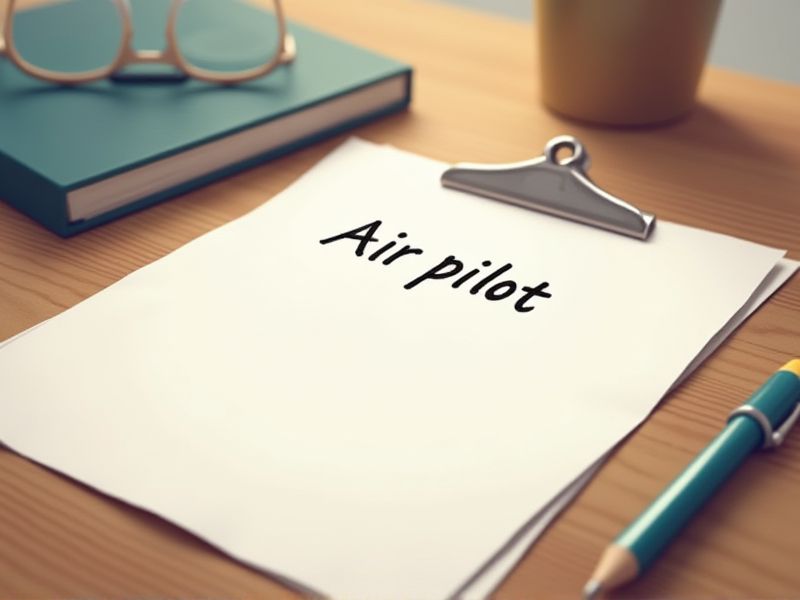
Air pilots carry the critical responsibility of safely navigating aircraft, requiring a high degree of expertise and a thorough understanding of aviation protocols. Certain certifications ensure that pilots are equipped with essential knowledge, skills, and competencies required for the operation of various types of aircraft. The need for these certifications mitigates risks and enhances safety standards, protecting both passengers and crew. Important certifications for air pilots include these crucial ones.
Private Pilot License (PPL)
Obtaining a Private Pilot License allows individuals to legally operate an aircraft, which is a fundamental requirement for any aspiring air pilot. The PPL certification process equips pilots with essential flight skills and foundational knowledge necessary for advanced training. With a PPL, pilots gain the ability to log hours independently, crucial for further certifications like commercial piloting. Regulatory bodies mandate the PPL as a baseline to ensure safety and competence in piloting activities.
Commercial Pilot License (CPL)
The Commercial Pilot License (CPL) serves as legal certification, allowing pilots to operate aircraft for commercial purposes, which is essential to ensure compliance with aviation regulations. By obtaining a CPL, pilots demonstrate advanced proficiency and knowledge, crucial for passenger safety and airline operations. CPL holders are required to pass rigorous training and examinations, signaling that they possess the necessary skills for handling complex flying situations. Airlines and commercial aviation entities mandate CPL as a standard qualification, ensuring that pilots meet industry standards for commercial air travel.
Airline Transport Pilot License (ATPL)
The Airline Transport Pilot License (ATPL) is necessary because it certifies a pilot's ability to operate as the pilot-in-command on scheduled air carriers' aircraft, thus ensuring a higher level of safety in commercial aviation. Holding an ATPL demonstrates that the pilot has met specific flight experience requirements and has mastered advanced skills, which are crucial for handling responsibilities on large aircraft. Regulatory bodies mandate the ATPL for pilots in command of multi-crew aircraft operations to standardize qualification standards globally. This license reflects a pilot's commitment to professional standards, bolstering their employability in the competitive aviation industry.
Instrument Rating (IR)
Instrument Rating (IR) is essential for pilots to navigate and operate aircraft in varying weather conditions without visual references, enhancing safety. The training broadens a pilot's skill set, allowing operation in controlled airspace where instrument flying is mandatory. Airlines and commercial operators often require IR, ensuring pilots can handle complex instrument flight procedures. Improved proficiency with instruments reduces the likelihood of spatial disorientation and navigational errors.
Multi-Engine Rating (ME)
The Multi-Engine Rating (ME) enhances a pilot's skills and confidence in handling aircraft with more complex systems. Pilots with ME can access a broader range of career opportunities, as many commercial and charter airlines require proficiency in multi-engine aircraft. Multi-engine planes offer increased performance and safety during engine failures, crucial for advanced flight missions. This rating is often necessary for pilots aiming to operate larger and faster aircraft essential for high-stakes operations.
Flight Instructor Certificate
Obtaining a Flight Instructor Certificate enables a pilot to teach and mentor aspiring aviators, thereby reinforcing their own skills and knowledge. Supervised teaching experience enhances a pilot's understanding of flight mechanics and regulations, contributing to greater aviation proficiency. Airlines often value instructors for their ability to create competent pilots, which can improve employment prospects. The certificate fosters a deeper commitment to safety and regulatory compliance, essential traits for any professional pilot.
Type Rating Certification
Type Rating Certification is necessary because it ensures pilots have the specific skills to operate particular aircraft models safely and effectively. Different aircraft have unique systems and handling characteristics, requiring specialized training to prevent operational errors. Regulatory bodies demand this certification to maintain safety and standardization across varied aircraft operations. Type rating also influences insurance parameters, reflecting the pilot's competency with specific aircraft.
Basic Safety Training Certificate
A Basic Safety Training Certificate equips an air pilot with essential skills for managing in-flight emergencies, as understanding safety protocols directly influences passenger and crew welfare. Proficiency in safety training ensures compliance with aviation regulations, which directly affects an airline's operational licensing and credibility. Possessing this certification enhances an air pilot's ability to make informed decisions under pressure, reducing the likelihood of accidents. Airlines prioritize hiring certified pilots, as their skills directly impact the airline's safety record and public trust.
Advanced Simulator Training Certification
Advanced Simulator Training Certification enhances a pilot's decision-making skills in emergency scenarios, leading to a significant reduction in aviation accidents. This certification ensures that pilots can handle complex aircraft systems without the inherent risks of in-flight training. Pilots gain experience in diverse conditions and scenarios which are impractical to replicate on actual flights. Regulatory bodies mandate such certifications to ensure compliance with evolving safety standards and airline protocols.
Crew Resource Management (CRM) Certification
Crew Resource Management (CRM) Certification is essential for pilots because it enhances communication and decision-making skills among cockpit and cabin crew, leading to safer flight operations. Effective CRM training reduces the risk of human error, which is a leading cause of aviation accidents. It fosters teamwork and efficient resource allocation, ensuring quick and coordinated responses during critical situations. CRM Certification aligns with regulatory requirements and industry standards, maintaining the pilot's proficiency and adaptability in complex flight environments.
Summary
By obtaining additional certifications, you enhance your skills and increase your marketability as a pilot. Your qualifications can lead to greater opportunities for career advancement and potential salary increases. You may also gain access to specialized positions, such as flight training or aviation management roles. Employers often view certified pilots as more reliable and capable, which can result in job security and professional growth.
